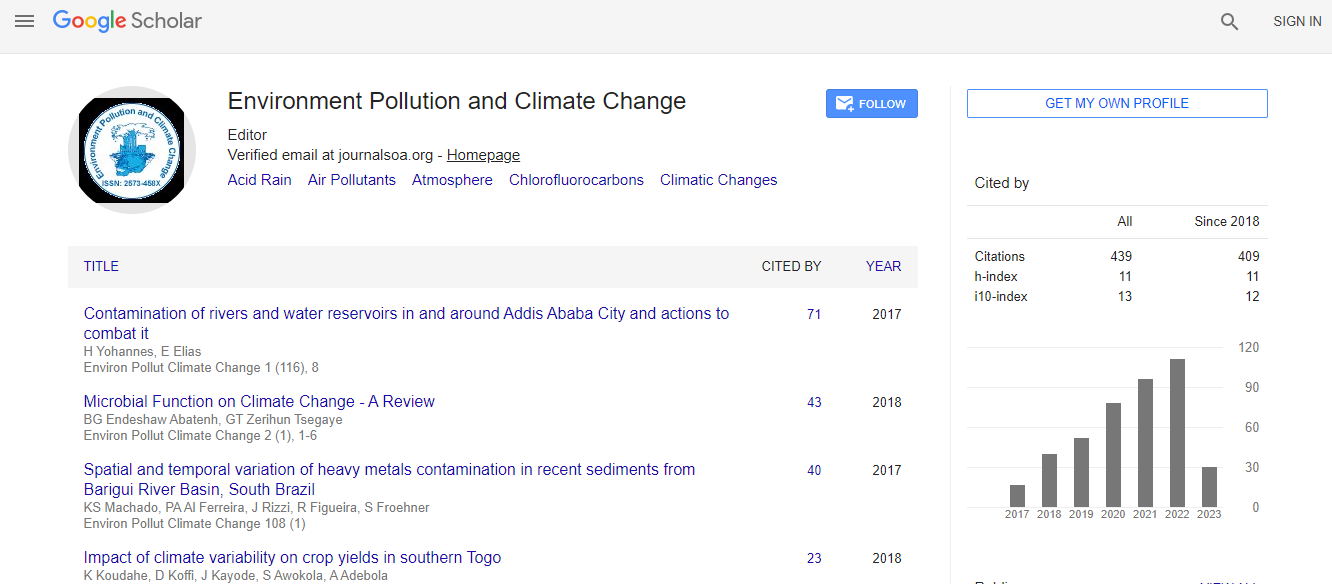Our Group organises 3000+ Global Conferenceseries Events every year across USA, Europe & Asia with support from 1000 more scientific Societies and Publishes 700+ Open Access Journals which contains over 50000 eminent personalities, reputed scientists as editorial board members.
Open Access Journals gaining more Readers and Citations
700 Journals and 15,000,000 Readers Each Journal is getting 25,000+ Readers
Google Scholar citation report
Citations : 672
Environment Pollution and Climate Change received 672 citations as per Google Scholar report
Environment Pollution and Climate Change peer review process verified at publons
Indexed In
- Google Scholar
- Publons
- Euro Pub
- ICMJE
Useful Links
Recommended Journals
Share This Page
Development of dispersive liquid-liquid microextraction procedure for trace determination of pesticide malathion in urine samples
Joint Event on 5th World Conference on Climate Change & 16th Annual Meeting on Environmental Toxicology and Biological Systems
Seyed Jamaleddin Shahtaheri, Maryam Ramin and Monireh Khadem
Tehran University of Medical Sciences, Iran
ScientificTracks Abstracts: Environ Pollut Climate Change
Abstract
Background: Measurement of pesticides in biological matrices is a serious challenge for researches because of their very low concentration in different matrices. The aim of this study was to develop a new sample preparation method with high accuracy, validity, simplicity as well as a short retention time for chromatographic determination of the pesticide malathion. Methods: Dispersive liquid-liquid micro-extraction (DLLME) technique coupled with high performance liquid chromatography equipped with ultra violet detector (HPLC-UV) was developed for trace extraction and determination of pesticide malathion in human urine samples. One variable at a time (OVAT) method was used to optimize parameters affecting the malathion extraction. Different parameters such as extraction solvent, disperser solvent, volume of the extraction solvent, volume of the disperser solvent, centrifugation time and speed salt addition, and sample pH were studied and optimized. Results: Under the optimized conditions, the limit of detection and enrichment factor of the developed procedure were 0.5 μgL-1 and 200, respectively. The calibration curve was linear in the concentration range of 2-250 μgL-1. The relative standard deviation for six replicate experiments at 200 μgL-1 concentration was less than 3%. The relative recoveries of spiked urine samples were 96.3%, 101.7% and 97.3% at three different concentration levels of 50, 200, and 1000 μgL-1, respectively. Conclusion: According to the obtained results, DLLME procedure was successfully developed for the extraction of malathion from human urine samples. Compared to other extraction techniques, the proposed procedure had some advantages such as shorter extraction time, better reproducibility, and higher enrichment factor. Recent Publications 1. Khadem M, Faridbod F, Norouzi P, Rahimi Foroushani A, Ganjali MR, Shahtaheri SJ, Yarahmadi R (2017).Modification of carbon paste electrode basec on molecularly imprinted polymer for electrochemical determination of diazinon in biological and environmental samples, Electro analysis, Vol. 29, 708-715. 2. 2. Khadem M, Faridbod F, Norouzi P, Rahimi Foroushani A, Ganjali MR, Shahtaheri SJ, Yarahmadi R Design and synthesis of a highly selective electrochemical sensor for occupational monitoring of diazinone, Journal of Health and Safety at Work, Vol. 7, No. 1, 9-23. 3. 3. Harati B, Shahtaheri SJ, Karimi A, Azam K (2017). Evaluation of health risk assessment of occupational exposure to chemical pollutant in an automobile manufacturing industry, Journal of Health and Safety at Work, Vol. 7, No. 2, 121-131. 4. Ghahri A, Golbabaei F, Vafajoo L, Mireskandari SM, Yaseri M, Shahtaheri SJ (2017). Removal of Greenhouse Gas (N2O) by Catalytic Decomposition on Natural Clinoptilolite Zeolites Impregnated with Cobalt. International Journal of Environmental Research, Vol. 11, No. 3, 327-337. 5. 5. Kakavandi NR, Ezoddin M, Abdi K, Ghazi-Khansari M, Amini M, Shahtaheri SJ (2017). Ion pair-switchable-hydrophilicity solvent based homogeneous liquid-liquid microextraction for the determination of paraquat in environmental and biological samples prior to high-performance liquid chromatography, Journal of Separation Science, Vol. 40, 3703-3709.Biography
Seyed Jamaleddin Shahtaheri completed his PhD from Surrey University, Guildford, England in 1996. He is an Academic Member of the Department of Occupational Health Engineering, Tehran University of Medical Sciences, Iran, acting as the Dean Research Deputy at the Institute for Environmental Research at the same university. He is a Member of the Persistent Organic Pollutant Review Committee (POPRC) under the Stockholm Convention, UNEP, UN. He has published more than 150 papers in reputed journals and has been serving as an Editorial Board Member of seven national and international journals.
E-mail: shahtaheri@tums.ac.ir

 Spanish
Spanish  Chinese
Chinese  Russian
Russian  German
German  French
French  Japanese
Japanese  Portuguese
Portuguese  Hindi
Hindi 
